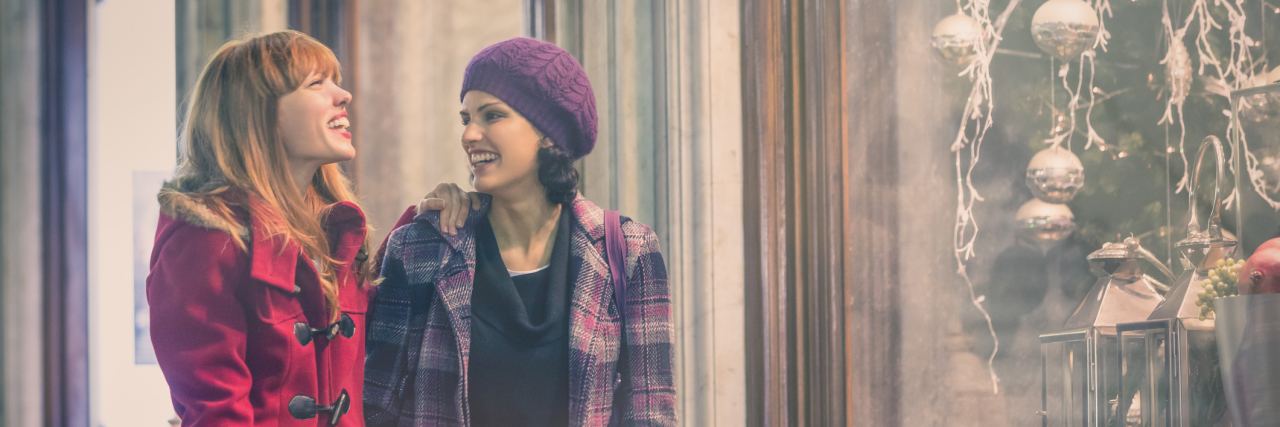It’s coming up to the end of the year, and once again the holiday season is upon us. Invitations for dinners and drinks with friends and family are being given and received, and shopping trips are being taken to find the perfect gift for a loved one. Around us, twinkly lights line the streets, festive tunes play on the radio and candles heavily scented with cinnamon and spice burn away in homes and shops.
All in all, the holidays are a time of sensory overload: lights, activity, sounds and scents.
For many, this sensory aspect of the holidays is an integral part of getting into the spirit of the festivities. It is part of the fun of this time of the year. But for me, as a person with vestibular migraine, all the sights and sounds of the holidays can be overwhelming and bring on difficult symptoms.
Last year I tried to get into the festivities despite my medical issues. I had a silly idea that I was simply going to ignore my symptoms and enjoy the holidays as I always used to. It started with Christmas shopping, a month or so before the big day. It was going to be great, I tried to convince myself. After all, it was a family tradition to go into central London to see the lights, scour the shops for gifts and stop for indulgent coffees with extra cream and a sprinkling of cinnamon. But in the back of my mind I knew this day meant dealing with a lot of potential migraine triggers. A lot of time on my feet, dodging the girls spraying perfume in department stores and dealing with the bustling movement of all the other shoppers traversing up and down Oxford Street. Traveling in a city, aside from anything else, can be a big trigger for many of us.
It all began well. Even after a poor night’s sleep due to slight anxiety about how it was going to work out. Everyone was in a good mood and we admired the lights and window displays. Lunch was eaten and coffee drunk. It was enjoyable, and I was glad I hadn’t pulled out of the day as I had deliberated earlier in the morning.
Then came the wander around the shops clutching our provisional lists of the perfect gifts. Of course, the shops were getting busier and noisier, and soon enough the twinkly lights were becoming less cute and more irritating in nature. The minutes, then hours, ticked away and my energy ticked away with them. Slight dizziness kicked in. The always-present headache increased to a more dominating pain across the temples. Then the floor started shifting under my feet, my vestibular system complaining about this long day. After a few vertigo turns, I went home early. It had all become too much. I sat on the train home with a lump in my throat, swallowing back the tears. I couldn’t “do” Christmas, it seemed to me. I had failed at being festive. Everyone else was having fun, but I couldn’t do it.
I sulked for days, maybe weeks. All with a slightly more dizzy, painful head than usual.
This year my approach has been rather different. I am not trying to “do” Christmas in the traditional way, or how others do it. I am not going to try and defeat my conditions by attempting to be “normal,” whatever that is, and carry on regardless of my health needs. Instead, I am going to enjoy the holidays while also respecting my body and conditions, and the limitations they pose.
So this year, I have been to see the lights and the shop window displays, but only for a couple of hours with a break for coffee when I needed to sit quietly for a bit. Some of my gifts for family have been bought online, and I have gradually bought others over the past month or so during quiet, short shopping trips. Much easier than one big, lengthy and stressful shopping expedition in December amongst all the other harassed shoppers. Perhaps this is less fun than before, but it means I will enjoy the holidays far more. It is a more relaxing, peaceful form of enjoyment that won’t result in increased symptoms or a tearful train-ride home.
Health issues, in my experience, mean that I have to listen to my body and make adjustments to my time. Sometimes this means not doing a particular activity at all, but often it just means doing the same activity for a shorter period of time, or over several trips rather than one. It means that boring task of pacing that doctors and occupational therapists tell us about. Or avoiding triggers that will bring on a migraine, or other flare-up of a chronic condition.
Years ago I would have pushed through and dealt with the consequences of an activity I wanted to do, no matter how detrimental it may be. Now I see that negative consequences just mean I came to associate something fun – the holidays – with something miserable – increased vestibular symptoms. That association, in turn, just brings on anxiety, which of course can cause an increase in migraines and vestibular symptoms as well. So this year I will be doing the holidays differently, and hopefully not getting increased migraine issues in the process. It isn’t “giving in” to do things a bit differently. It doesn’t mean that you don’t have a good time. In fact, in my experience, altering activities to accommodate the symptoms of chronic conditions can mean having a far more enjoyable time with friends and family.
This story originally appeared on Through the Fibro Fog.
Getty Image by ZoneCreative

